Mosquito Frequently Asked Questions (FAQ)
Mosquitoes are a health concern and unwanted guests when we spend time outside. We have compiled the most frequently asked (FAQ) questions regarding mosquitoes on this page. If you have a question, that is not listed, feel free to call our office Monday to Friday 8:00 am to 5:00 pm EST.
What is the life cycle of a mosquito?
There are four (4) stages in the Mosquito Life Cycle. First, eggs hatch to become larvae, which then grow into pupa. The adult mosquito emerges from the mature pupa as it floats at the water surface.
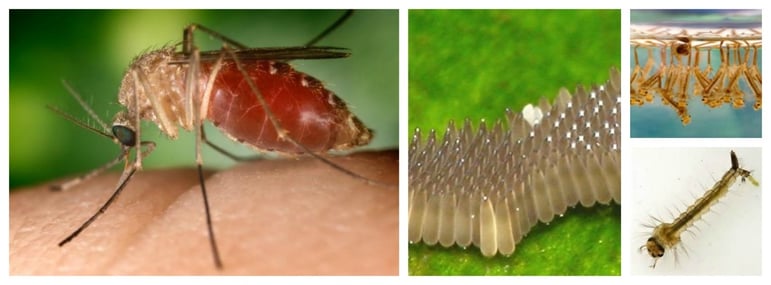
How long do mosquitoes live?
Bloodsucking mosquitoes (females), depending on their specific species, sex, and environmental weather factors can live as short as a week to as long as several months. As with humans, the females typically live longer than males as male mosquitoes typically live for about 5–7 days.
How do mosquitoes reproduce?
Adult females lay their eggs in stagnant water; some female mosquitoes may lay eggs near the water's edge as some breed in lakes. Some may also lay their eggs in temporary puddles.
Adult mosquitoes normally mate a few days after emerging from the pupal stage. The males form large swarms, normally when it is cooler, like around dusk, and the females fly into the swarms to mate.
The cycle repeats itself until the female dies. While females can live longer than a month in captivity, most do not live longer than one to two weeks in nature. Their lifespans depend on temperature, humidity, and their ability to successfully obtain a blood meal while avoiding host defenses and predators.
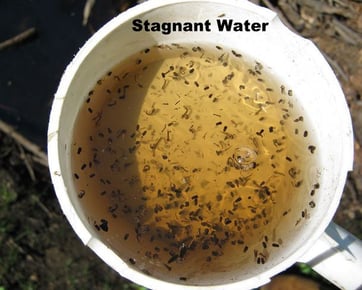
What do mosquitoes eat?
The female mosquito is the one that drinks blood and is the real nuisance. Females need blood to reproduce, so once the female feeds she will rest for a few days to allow the blood to be digested, which then allows the eggs to develop. Once the eggs are fully developed, the female lays them in a water source and then resumes with the reproductive cycle by searching out males. This cycle repeats itself until the female dies. For food, both males and females eat nectar and other plant sugars. Therefore, you will find both male and female mosquitoes hanging out in cool spaces during the heat of the day, such as in shrubs where they can suck the nectar of leaves.
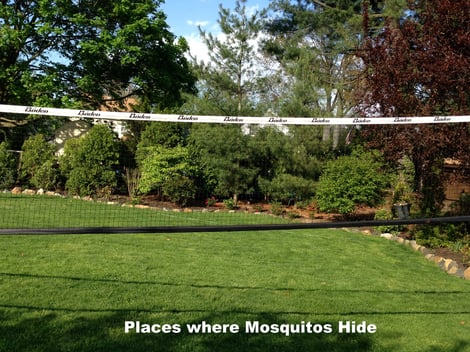
Remember, only the female mosquito bites. If you get bitten by a mosquito, it means eggs will get laid and more mosquitoes will be coming to a yard near you.
Do mosquitoes bite everybody?
Mosquitoes that transmit diseases like Zika, Malaria and West Nile prefer people over animals and some people more so than others.
How do mosquitoes find us?
Mosquito senses are tuned for locating perfect hosts, since they need them for survival. From surprisingly far distances away from their food source, mosquitoes can detect carbon dioxide from our breath draws them in and triggers their visual system to seek out high contrast objects for inspection. Up close, mosquitoes detect odor, temperature, and sweat. Alcohol is also believe to be a scent mosquitoes can detect.
What is the size of the average mosquito?
The average size in length of an adult mosquito is typically between 3 mm and 6 mm. The smallest known mosquitoes are around 2 mm (0.1 in), and the largest around 19 mm (0.7 in).
What does a mosquito weigh?
Average weight of a mosquito is approximately 5 mg.
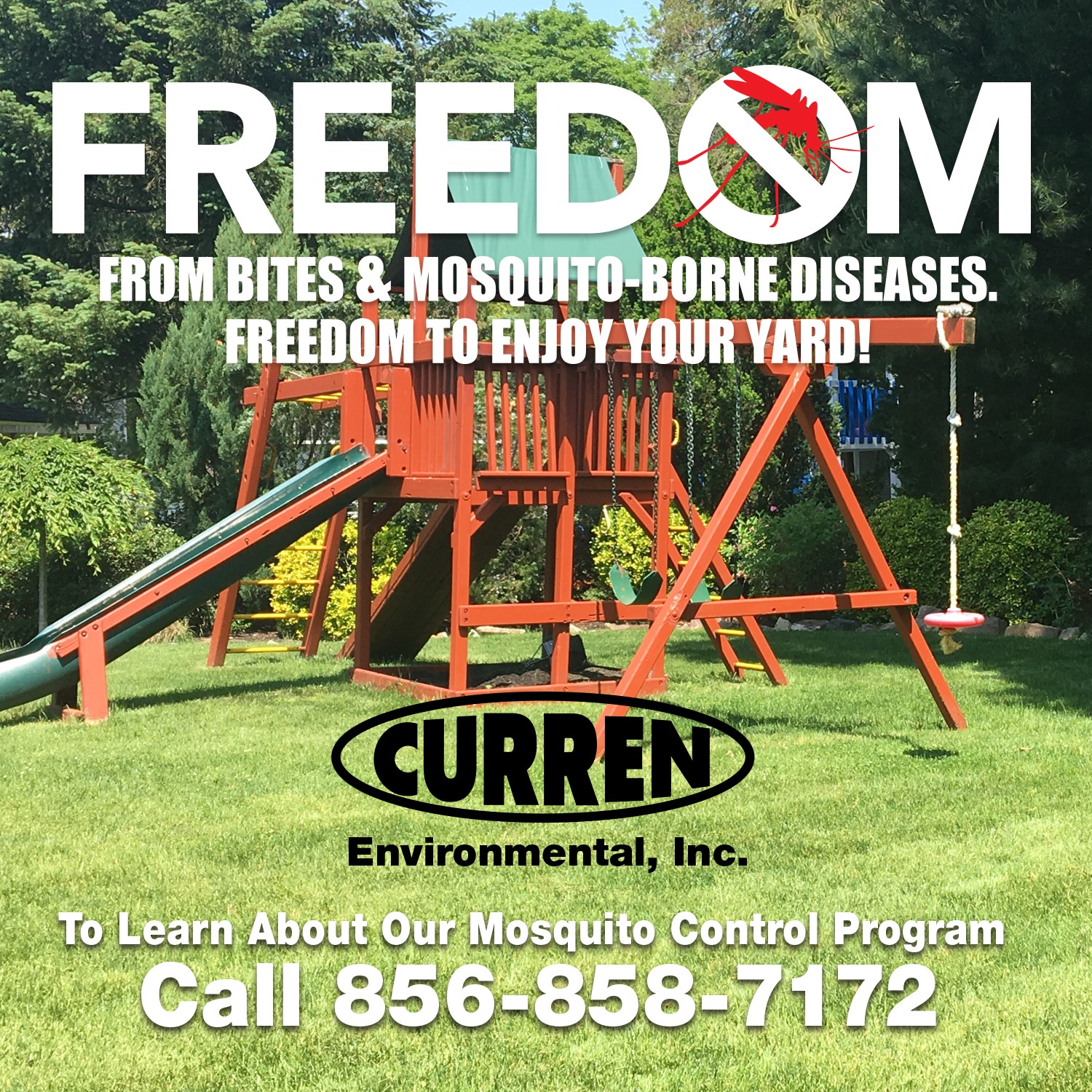
How high does a mosquito fly?
Mosquitoes like to fly at the bite zone which is average human height. During the heat of the day, mosquitoes stay low to the ground, the cooler the better. As the day gets cooler they will fly higher. Generally speaking mosquitoes fly below 25'. The Asian Tiger mosquito can fly higher than most and will fly in the heat of the day, we like to say the Asian Tiger mosquito is an angry mosquito.
How do mosquitoes find you?
Again only, the female is the blood sucker as male mosquitoes only eat nectar. The female mosquitoes hunt for a blood host (humas, animals, ect) by detecting organic substances such as carbon dioxide (CO2) and 1-octen-3-ol, which we produce naturally. Mosquitoes can also find hosts through optical recognition.
Like people, the female mosquito likes the taste of one person over another. If you have ever been attacked by mosquitoes and the person with you has yet to be, you are the preferred blood host. The preferred blood host basically has an enticing smell and thus is more appetizing. It is believed the smell correlates to the proportions of the carbon dioxide, octenol and other compounds that make up the body odor.
If you really want to get technical, the semiochemical (chemical substance that sends a signal from one organism to another) that triggers the keen sense of smell of mosquitoes is Nonanal (a colorless, oily liquid). Sulcatone or 6-methyl-5-hepten-2-one, is another target odor (Sulcatone makes our scent human). Bottom line… due to how nature designed a mosquito, the large part of the mosquito’s sense of smell is intended to detect blood sources. A typical mosquito has 72 types of odor receptors (They are located on the mosquito antennae),
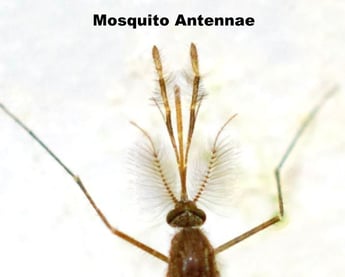
at least 27 of these 72 receptors are dialed into detecting chemicals found in sweat/perspiration. Mosquitoes use a shotgun approach to finding food source in an area, then they fine-tune their aim to a dedicated target, which are you and me.
One common myth is that using a fan will repel mosquitoes… wrong! People believe that since mosquitoes are light the airflow generated from a fan will repel mosquitoes. What the fan does is disperse our scent, so that mosquitoes cannot hone in our scent.
Mosquitoes can detect a food source (blood meal) 75 feet away.
Since mosquitoes are designed to find carbon dioxide, which humans and other animals produce, it should be no surprise that their range is approximately 75 feet. Mosquitoes are smart, once they detect the general area you are in, the mosquito (female) will fly back and forth through the CO2 plume until you are located.
Why do mosquito bites itch?
Mosquitoes bite with their proboscis, when they do so they stab two tubes into your skin: one to inject an enzyme that inhibits blood clotting so they can get a good drink of your blood and two to suck blood into their bodies. The saliva from the bites induces an allergic response from the victim’s immune system; that is why your skin itches. The female mosquito needs blood for protein for their eggs and for nourishment.
How do I get rid of mosquitoes?
An integrated approach to mosquito management or reduction is necessary. Integrated means managing breeding grounds and the application of a barrier spray that will kill mosquitoes and provide a long-term barrier for future mosquitoes. Remember, all mosquitoes need water to breed, so any approach to diminishing the mosquito population involves limiting water breeding areas. Common breeding areas for mosquitoes, aka areas where water sits include the following:
- Tree holes
- Recycling containers
- Flower pots
- Frisbee
- Children toys
- Clogged or improperly sloped gutter
- Plastic corrugated gutter extensions
- Old tires
- Buckets
- Plastic covers or tarpaulins
- Water bottle caps.
What is a mosquito barrier spray?
The barrier spray is a water based surfactant and low dose insecticide that is applied around the perimeter of a yard. The spray is mostly water and a surfactant (soap) that will coat surfaces where applied. The surfactant helps the insecticide stick to the foliage, think soap scum. The spray is applied to shrubs, foliage and other areas within the area to be protected from mosquitoes. This barrier is targeting adult mosquitoes and effectively knocks down the population. The spray dries colorless and odorless and has no phytotoxic effects (i.e., no toxic effect on plants).
Why is a microencapsulated barrier spray more effective for mosquito control?
Microencapsulate should be considered a form of time release for the mosquito control. The process is where the active ingredient is actually encased in a shell and allows the release to be gradual over time. For example if you have a large bubble, and within that bubble are tiny bubbles – the tiny bubbles are released over a period of time.
Does rain affect the mosquito barrier treatment?
Rain is typically not a concern. Our equipment delivers precise fogging at a high velocity that will blast standing water off plants and fences to help with the drying process. Our barrier application can dry within 6 minutes and is designed to hold fast with bubbles inside of bubbles that pop over time, that gives you the 21 days security. We also use a non-ionic surfactant that provides a sticky affect. Hey you have soap scum in your shower? Yet you use water in your show so soap scum should just roll away with the RAIN Droplets from your shower? Nope doesn't work that way. Our treatment mixture is similar but has a more boring foundation in science. Lets just say, IT JUST WORKS. Additionally when we spray we are targeting mosquitoes hiding in your yard during the day. Our application will take down these active biters rain or shine, that is why you can see a same day reduction in mosquitoes. The 21 day aspect is for new mosquitoes and ones that fly to your yard from your neighbor who doesn't know about our service.
But hey there is a thing called POP UP Rain Showers, if you feel that the treatment is not allowing a huge increase in your outdoor enjoyment, call our office we can come back out at no charge. Bottom line we want you to be happy and become a long term client.
I am concerned about spraying a chemical to remediate mosquitoes?
Remediation means the removal, so if you wish to remove mosquitoes from your yard, you will need a compound that will remove the mosquito. Mosquitoes are extremely small, the amount necessary to kill a mosquito is minuscule. Did you know a raindrop can knock a mosquito to the ground, but since their bodies are small and pliable, the raindrop will not actually kill a mosquito.
What are the compounds you use in the barrier spray?
Water or H2O is the primary ingredient. A surfactant (soap) is added to allow the compound to adhere to foliage and lastly an EPA and NJDEP approved and permitted insecticide is added, which is what takes down the mosquitoes. A primary take down compound is Permethrin, which is one of a group of chemicals called pyrethroids. These are a synthetic form of a natural insecticide found in chrysanthemum flowers. Permethrin is EPA approved and kills mosquitoes by disrupting their central nervous systems. Permethrin is not harmful to people and animals in small amounts. Of all the chemicals that you can spray to deter mosquitoes, the CDC (Centers for Disease Control) lists only four chemicals as being effective for repelling mosquitoes: DEET, Picaridin, Oil of Lemon Eucalyptus (or its synthetic version, called PMD) and IR3535.
How does the barrier spray have a long lasting effect?
To control mosquitoes you have to think like a mosquito. Mosquitoes are small and the heat of the day and direct sunlight can dry out a mosquito and kill it, which is why you will be bitten by mosquitoes at the end of the day or evening when it is cooler out. (there are some mosquitoes that will bite you during the day, the Asian tiger mosquito is one of them, but these are a small percentage of the overall mosquito population).
How do you know so much about mosquito control?
Curren Environmental has been providing remedial solutions for close to 20 years. We remediate petroleum hydrocarbons, vapors, mold, and soil and groundwater contamination. Being environmental professionals we are knowledgeable about the environment and ecosystems. We are uniquely suited as mosquito remediation professionals. Unlike seasonal business or franchises that do mosquito control, our business has been established for decades and runs year round providing environmental services.
What about natural barrier sprays?
We have tried garlic sprays, which are meant to mask your scent, which the female is attracted to, so the mosquito cannot find you. The female mosquito is determined to find a blood meal so she can lay eggs, the mosquito is engineered to suck blood, trying to hide with garlic sprays may delay the mosquito from finding you, but eventually you will be tracked down.
How do we know garlic sprays are ineffective?
We have tried it, it certainly makes your yard smell as if you are cooking something tasty, but it does not effectively deter the blood sucking mosquitoes. We have also tried the homemade approach of Listerine, soap and peppermint oil. This concoction is meant again to disguise your scent from the mosquito and the Listerine is believed to give the mosquito diarrhea, which will cause the mosquito to get dehydrated and die. We have tried this approach as well with no positive effect besides spreading the scent of Listerine and peppermint oil.
Why can’t I just use a spray on my body?
Treating your body is the first line of defense as you are applying a chemical to your skin that your body absorbs. First the chemical is directly on your skin and that can cause irritations as some people are allergic to the chemicals. Also, the spray can wear off fast and you are still expelling carbon dioxide which is what the mosquito can smell thus finding you attractive to bite.
How fast do mosquitoes fly?
On average mosquitoes fly between 1 and 1.5 miles per hour. Regarding speed, mosquitoes are slow, butterflies, locusts, and bees are all faster.
Why do I hear buzzing in my ear from a mosquito?
A mosquito's wing can beat between 300-600 times per second. Their wings beating is that buzzing sound you hear just before a mosquito bites.
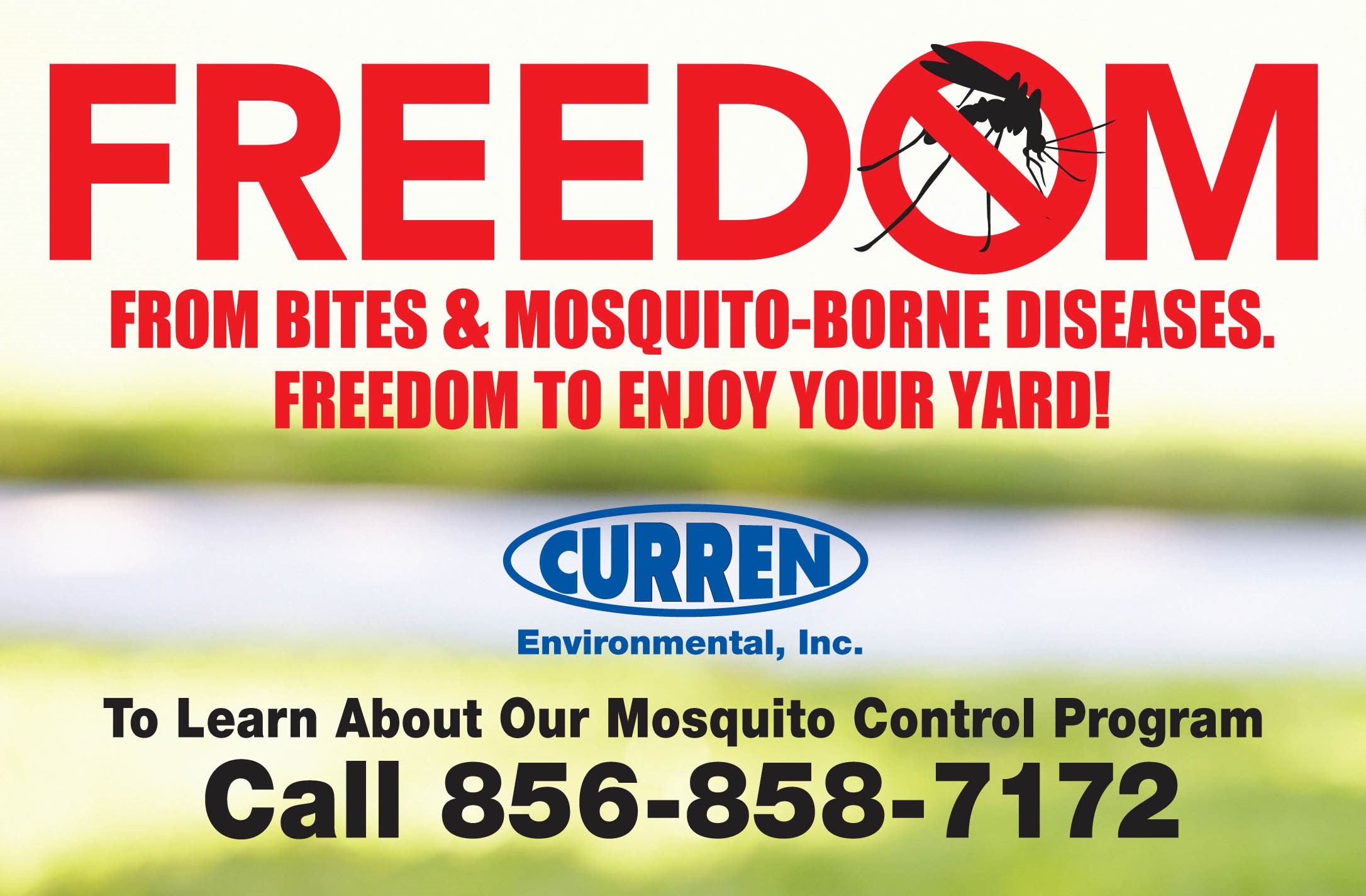
How far do mosquitoes travel?
Most mosquitoes are home bodies and will not stray far from where they were born. The exception being salt marsh mosquitoes, which can travel up to 100 miles from their breeding ground to find a suitable place to live that is plentiful in nectar and blood.
How do I hide from mosquitoes?
The best time to avoid mosquitoes is in the afternoon, when temperatures are the hottest. Mosquitoes hang out in cool places during the day, which can include shrubs, beneath decks and generally shady places. Being outside at the best time of the day – dusk during the spring and summer months is the actually the best time of day for the mosquitoes to attack.
What is Water Control?
Water Control is 95% of the fight. But mosquitoes can breed in a bottle cap of water. Gutters, flower pots (empty ones) and trashcans. Recycling cans turned upside down can hold enough water to breed mosquitoes. If you have a leaf blower go around your yard blowing possessions in your yard, if you see a hint of water blowing, move the item indoor. Also google or type www.MosquitoRemediation.com, there are a number of services that spray yards to knock down populations of mosquitoes.
Remember only female mosquito bite, and they only bite to lay eggs, so if you get bitten it means the mosquito needs blood to lay eggs which increases the mosquito population.
Does the Zika Virus Infection cause birth defects?
Based on the CDC article "Population-Based Surveillance of Birth Defects Potentially Related to Zika Virus Infection — 15 States and U.S. Territories, 2016" posted on January 26th, 2018 it has potentially been known to cause some birth defects in those territories mentioned in the article.
Does swatting away mosquitoes help? Someone told me it does.
There was a study that had participants swat at mosquitoes and missing. The study claimed that the mosquitoes learned the scents of the swatters and learned that if that that scent could do them harm so they stayed away from those parties. Makes sense, the mosquitoes can assess risk and danger and learn to stay away. My opinion is swatting cant hurt you.
I want to go outside without mosquitoes biting me, how do I get rid of mosquitoes?
Call
856-858-9509
Try our Mosquito Remediation service



